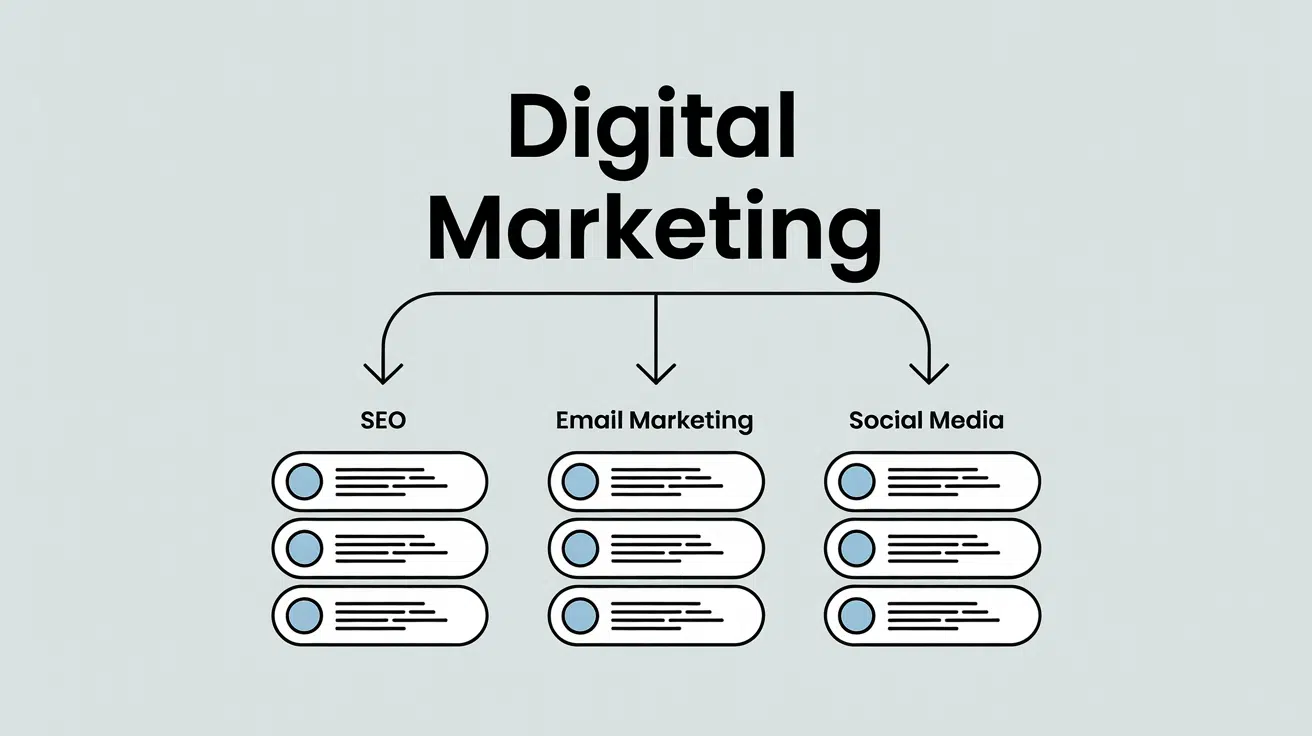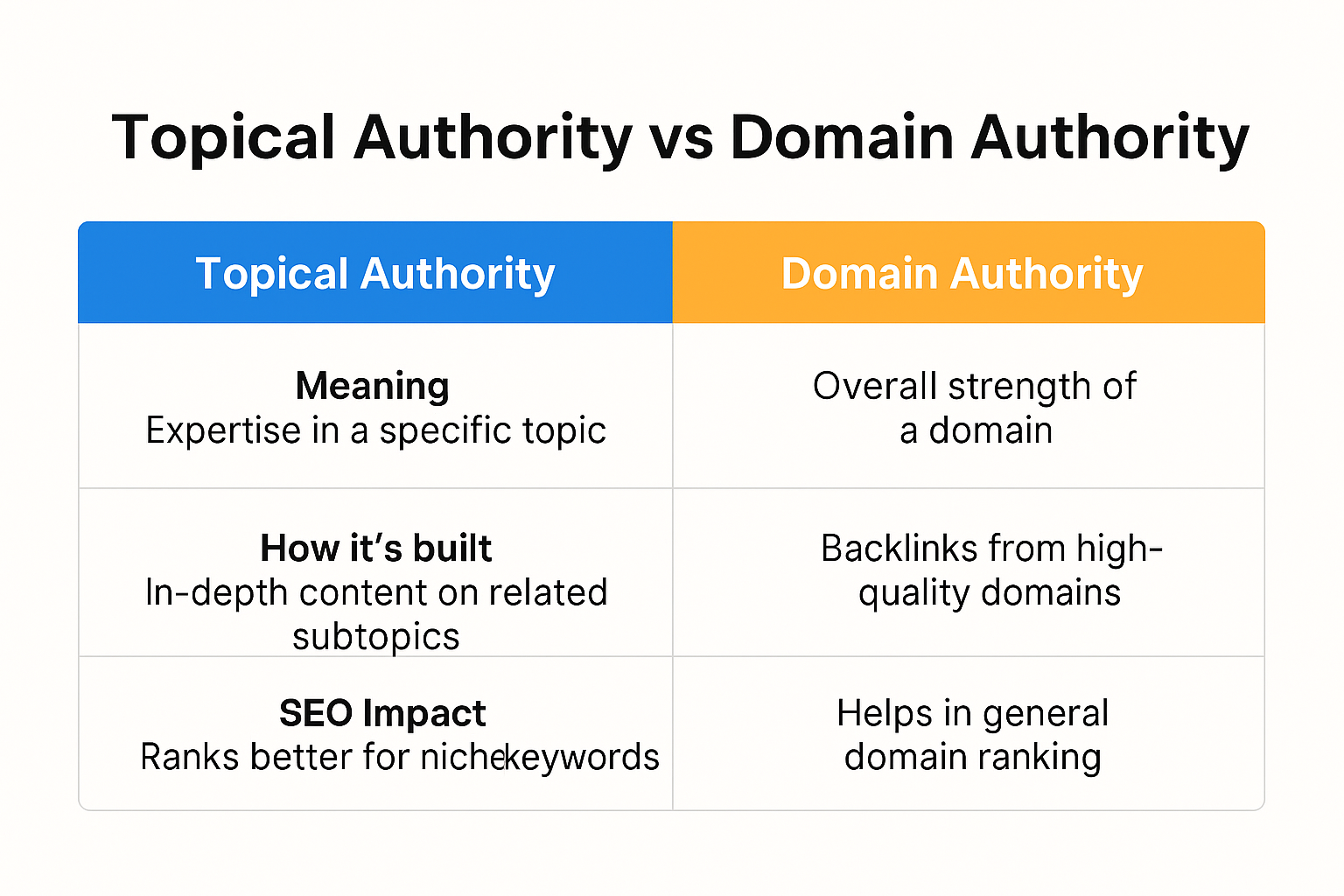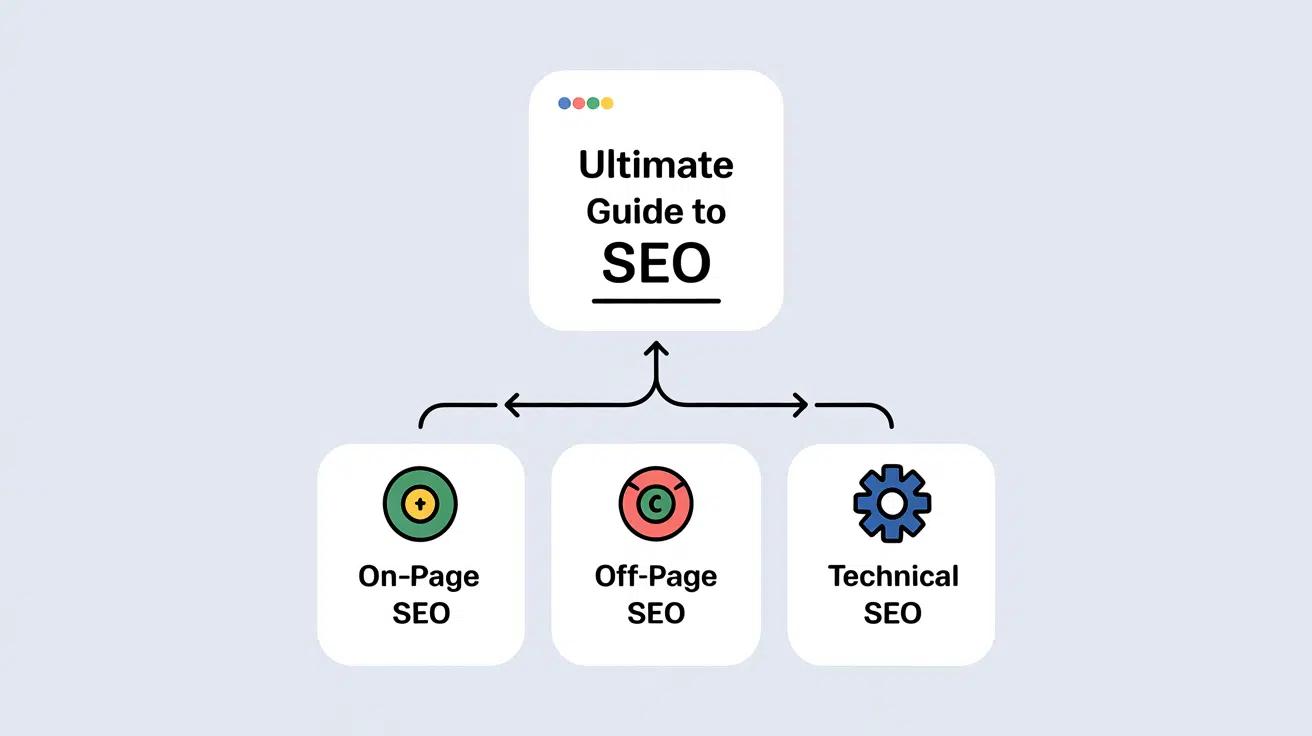Have you ever wondered why some websites always show up at the top of Google, even when their “Domain Authority” isn’t super high? The secret behind their success is something called Topical Authority. And in 2025, it’s more important than ever to get traffic from search engines.
In this easy guide, I will explain what Topical Authority means ?, why it matters, and how you can build topical authority to boost your website’s rankings.
What Is Topical Authority in SEO? Let’s Go Deeper
You might think getting to the top of Google is all about writing tons of articles, right? Well, not exactly. Topical authority in SEO means something more. It is not just about writing a lot—it’s about writing smart.

You need to build content like a spider’s web. Here’s how that works:
- Pillar Content – This is your big, main article. It covers the main topic. For example, a big guide about “Digital Marketing.”
- Cluster Content – These are smaller articles that focus on parts of the big topic. Some examples could be:
- “What is SEO?”
- “Best Tips for Email Marketing”
- “How to Use Facebook Ads”
- “Why Content Marketing Works”
- Linking Everything Together – Each of those small articles links back to your big article. They also link to each other when it makes sense.
This structure helps Google understand that all your content is related. It shows you are not just posting random stuff. You are creating a full library around one subject. That’s what is called SEO topical authority.
Why Topical Authority Matters More Than Ever in 2025
You may be thinking, “I already use keywords and get backlinks. Isn’t that enough?”
Those things still help, but in 2025, search engines care even more about how well you cover a topic. Here is why topical authority is now super important:
1. Google Understands More Than Just Keywords
In the past, Google mostly looked at what words were on the page. Now, it tries to understand the meaning behind your words and what the person searching really wants. If you have written lots of helpful articles on one topic, Google knows you are not just guessing—you really know your stuff.

Let’s say someone searches for “how to start with digital marketing.” If you have a full guide and detailed articles about email, SEO, social media, and ads, your site will look like a helpful place. That makes Google want to show your site higher in search results.
2. Better User Experience
When someone visits your website and sees that all their questions are answered in one place, they are more likely to stay longer and explore more. That’s called a good user experience.
Google notices things like:
- Do people leave right away? (That’s called a “bounce.”)
- Do they stay and read more?
- Do they click other links on your site?
If users enjoy your content, that’s a big win for your rankings.
3. You Don’t Need As Many Backlinks (But They Still Help)
Backlinks—when other websites link to your content—used to be one of the biggest ways to rank. They still matter, but they are not the only way.
If Google sees that your site explains everything about a topic and all your content is linked together in a smart way, it might rank your site higher even if you don’t have tons of backlinks.
So, if you are just starting out, building topical authority can help you grow faster without waiting for lots of links from other websites.
4. You are Ready for the Future
Search engines are getting smarter every year. They are using AI and machine learning to figure out who the real experts are.
If you have already built strong topical authority, you will be ahead of the game. You won’t have to panic when Google updates its rules—you will be seen as a trusted source because you have done the work to cover your topic well.
5. You Build Trust (E-E-A-T)
Ever heard of E-E-A-T? It stands for:
- Experience
- Expertise
- Authoritativeness
- Trustworthiness
These things matter a lot—especially if your website gives advice about health, finance, or other serious topics (called YMYL: “Your Money or Your Life”).
Topical authority helps with E-E-A-T. When your site shows deep knowledge and useful advice, people—and search engines—are more likely to trust you.
Is Topical Authority Helping You Rank Higher?
Yes, it really is! Topical authority is not just a fancy idea — it actually works. When your website becomes a trusted source on one topic, Google sees it as helpful and important. This means your pages are more likely to show up higher in search results.
Here’s how Topical Authority helps your website grow:
1. Better Rankings for Main Keywords
If you write a lot of detailed and useful content on one subject, Google understands that you are an expert. This helps your main keywords rank higher.
2. Ranking for Long-Tail Keywords
As you add more content, you will also start showing up for longer, more specific searches — these are called long-tail keywords. For example, if your topic is “gardening,” you might rank for searches like “how to grow tomatoes in pots.” These keywords bring in more traffic.
3. More Organic Traffic
When you rank for both main and long-tail keywords, more people will find your website through Google. That means more visitors without needing to pay for ads.
4. Stronger Website Authority
If you keep building good content in your topic, your whole website becomes stronger over time. Even new pages will start to rank better just because your site is seen as trustworthy in that subject.
What’s the Difference Between Topical Authority and Domain Authority?

Domain Authority (DA):
This is a score made by websites like Moz. It shows how strong your website is overall. It mostly looks at how many other sites link to your pages and how trustworthy those sites are. A high DA usually means your website is popular and respected across many topics.
Topical Authority:
Topic Authority is all about how much you know about one topic. If you write a lot of helpful and connected articles about one subject, Google sees you as a professional in that area — even if your site is small or new. For example, a small blog that only writes about orchids can become the go-to place for orchid info, even if it doesn’t have a high DA.
Why Both Matter ?
Having a high Domain Authority is great — it helps your site rank overall. But that doesn’t mean your site is seen as an ace in every topic. On the other hand, having strong Topical Authority in one subject helps you beat bigger websites that only touch the topic lightly.
The best plan? Try to build both. If you focus on one topic and write great content, other sites may start linking to you. Those backlinks can raise your Domain Authority. So the two work together — Topical Authority brings you trust and traffic, and that can help grow your Domain Authority too.
How to Build Topical Authority: Your Actionable Roadmap
So, you are ready to become the go-to expert on a topic? Great! Building Topical Authority just means you are creating really helpful and connected content around one big subject. It takes some planning, patience, and smart writing.
1. Choose a Topic and Stick to It
Don’t try to write about everything. That can twist your readers and search engines too. Instead, pick a few major topics that you really know a lot about.
Ask yourself:
- What concerns can I help people solve?
- What questions do people ask that I can answer?
Do smart research:
- Look up keywords, but think about what people actually want when they search (Are they looking for answers? Products? Advice?).
- See what your competitors are doing. What are they writing about? Can you do it better or cover what they missed?
2. Create Pillar Content (This Is Your Main Page)
Once you choose your topic, write one big, strong piece of content. This will be your “pillar” or main page. It covers the whole topic in a deep and helpful way.
Make sure it:
- Is long and detailed (usually 2,000 words or more).
- Explain the big idea clearly.
- Includes links to smaller, related pages (we’ll get to those next).
Example:
If your topic is vegan cooking, your pillar might be something like:
“The Complete Beginner’s Guide to Vegan Cooking.”
3. Write Cluster Content (These Are Your Support Pages)

Now, create lots of smaller articles that connect to your main pillar. These are called clusters. Each one should talk about a specific part of your big topic.
Each cluster should:
- Focus on one small thing (like recipes, tips, tools, etc.).
- Be complete and helpful.
- Link back to your main pillar page.
- Link to other clusters when it makes sense.
Also: Use long-tail keywords (like “easy vegan lunch recipes” instead of just “vegan food”).
Examples of our vegan cooking topic:
- “Easy 30-Minute Vegan Dinner Recipes”
- “How to Bake Vegan Cakes Without Eggs”
- “Best Plant-Based Milk Alternatives”
- “Vegan Pantry Must-Haves for Beginners”
4. Use Smart SEO Tricks (Help Google Understand)
Search engines today look at more than just the main keyword. They look at the meaning and related words too.
Here’s how to help:
- Use related words and synonyms (like “plant-based” for “vegan”).
- Answer questions people ask on Google (check the “People Also Ask” section).
- Add special codes like FAQ or How-To schema (this is a little advanced but helpful for search engines).
5. Make Sure Your Site Is Easy to Use
If your site is messy, slow, or hard to read, people will leave. That’s bad for your rankings.
Fix these things:
- Make sure it’s easy to click around and find stuff.
- Make it mobile-friendly (works well on phones).
- Keep your site fast (use small images and a good design).
- Use simple headings, short paragraphs, and bullet points to make reading easier.
6. Keep Things Fresh
You can’t just write once and forget it. The internet changes, and so does good content.
Keep updating:
- Add new info when something changes.
- Rewrite old parts to keep them current.
- Look for new questions people are asking and write more clusters.
Also:
Check all your internal links once in a while to make sure they still work and point to the right pages.
7. Get Some Backlinks (Still Very Helpful)
Even though you can grow with strong content alone, it still helps when other websites link to you. It tells search engines, “Hey, this site knows its stuff!”
Try to:
- Get links from trusted sites in your topic area.
- Offer guest posts or be part of expert roundups.
- Create helpful resources that others want to link to.
8. Track Your Progress
Once you have built up your content, it’s time to see how it’s doing.
Use free tools like:
- Google Analytics (to see who visits your site and how long they stay).
- Google Search Console (to check which keywords you are ranking for).
Keep an eye on:
- Your keyword positions (Are you moving up in Google search results?).
- How much traffic is your site getting?
- How users behave (Do they read more than one page? Do they stay a while?).
Topical Authority Tools & Topic Authority Checker
You might be wondering, “Is there a special tool that tells me how good I am at a topic?” Well, there’s no single tool that gives you a score for Topical Authority like Domain Authority does. But don’t worry! There are a bunch of tools that can help you check, grow, and plan your content to become a real expert on any topic.
Let’s go over the best tools you can use:
1. Ahrefs – Content Gap Tool
This tool helps you find out what keywords your competitors are ranking for — but you are not. It’s super useful because it shows you what topics or articles you’re missing.
2. Semrush – Topic Research Tool
This one helps you find subtopics inside a big topic. If you type in a main idea, it shows you lots of smaller ideas you can write about. This is great for building content clusters. Think of it like breaking a big project into smaller, easier tasks.
3. Surfer SEO & Frase
These tools check out the top-ranking pages on Google and tell you what to include in your content, like keywords, subheadings, and extra ideas. This way, you don’t miss anything important. They help you make your article complete and helpful for readers.
4. Google Search Console
This is your own secret weapon. It tells you what words people are typing into find your website. If you notice certain topics are doing well, you can write even more about those and build deeper content around them.
5. Google’s “People Also Ask” & Related Searches
Just type a question into Google and scroll down. You will see lots of related questions and searches. These are great ideas for more content. They are what people are actually looking for, so answering them builds trust and authority.
Conclusion
Topical Authority isn’t just some fancy term. It’s actually a smart way to grow your website. Instead of writing about random things, you focus deeply on one topic at a time. You build a bunch of helpful, related content and connect them with links.
Doing this helps Google understand what your site is about. More importantly, it helps people trust you because you have written everything they want to know.
So, pick your topic, build your content cluster, and connect your pages. With time, you will notice your website getting more traffic and attention.

Sure! Here’s a short author bio written in first person:
I’m Shivam Panchal, an SEO expert and digital marketer from Delhi. I run SEO Shades, where I share practical SEO tips, link-building strategies, and website growth hacks. With over 3 years of experience, I help businesses boost their online visibility and rank higher on Google.

